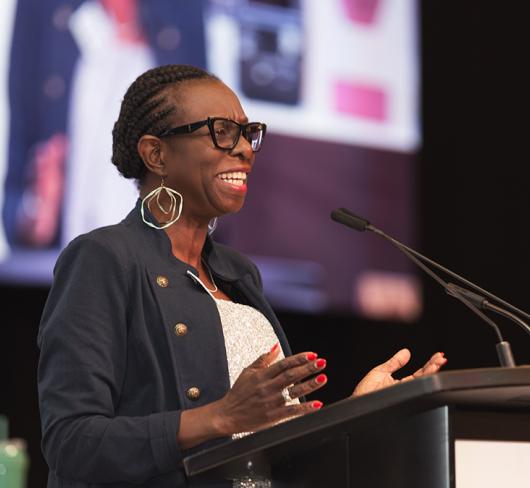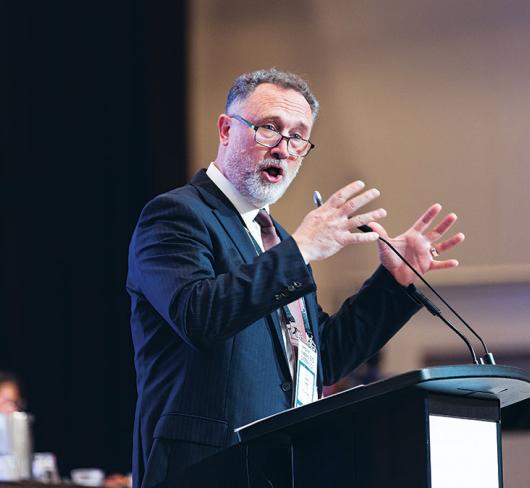Your Federation
…And Still We Rise Conference
At ETFO’s 2009 …and still we rise conference, Margaret Trudeau received a standing ovation from the 500 participants and brought tears to the eyes of many. Trudeau told the story of her life as the wife of a prime minister, mother, and life-long sufferer of bipolar disorder. Trudeau was 22 when she married Pierre Elliott Trudeau, a man 30 years her senior. She was, she said, unprepared for life as the prime minister’s wife and described 24 Sussex, the official residence as “the crown jewel of the federal penitentiary system.” Trudeau called bipolar condition a “lifelong sentence… 80 percent depression and 10 per- cent mania.”
“Ten years ago I was a defeated woman. I lost my son (Michel died in an avalanche) and fell into a deep well of despair that was more than grief.” Trudeau described her confinement in psychiatric wards and experiences with a variety of treatments. Today she advocates for more openness about mental health issues.
Rona Maynard, author and former editor of Chatelaine magazine, reminded participants that it is never too late to change as she shared her personal journey from “intimidated over-reactor” to a “confident, consensus-minded leader.” Luba Goy, of the comedy show, Air Farce, said one her teachers played a key role in encouraging her to participate in public speaking.Yvonne Oswald,author and communications trainer, emphasized the importance of framing “self-talk” positively.
The conference theme was “Connecting Caring Citizens in Schools and Communities.” Participants heard from a broad range of community leaders and were entertained by Gemini nominated singer-songwriter, Kellylee Evans, and the Collective of Black Artists. Participants also took part in workshops organized around the themes of social justice advocacy, health and well-being, curriculum, and strategies for success. Previously open only to ETFO members, the conference was open to women from across the country for the first time this year.
ETFO Attends Ontario NDP Leadership Convention
Over the March 6–8 weekend, ETFO representatives attended the Ontario NDP leadership convention that elected the party’s first woman leader, Hamilton Centre MPP Andrea Horwath. On the Friday evening Horwath, along with other leadership candidates, visited a successful hospitality suite hosted by the Ontario Teachers’ Federation and its four affiliated federations. The suite was the perfect gathering place for the numerous teacher delegates, including an impressive number of ETFO members, who wanted to talk politics and share views about the pending leadership vote.
ETFO’s booth at the convention provided delegates with information about the federation’s position on a number of issues, including the fundraising gap for elementary students, our model full-day kindergarten, and our members’ concerns about the effects of EQAO testing. The booth provided a great opportunity to raise ETFO’s profile and to discuss education issues with NDP activists from across the province.
ETFO provides some financial support to members who attend provincial and federal political conventions as delegates. For details about this support, look for the information about convention subsidies in the Political Action section of the ETFO website. ETFO executive and staff attend the political conventions of all three main political parties as part of the federation’s ongoing monitoring of Queen’s Park and the political process. ETFO also attended the Ontario Progressive Conservative Party convention in Niagara Falls in February.
ETFO executive members David Clegg, Sam Hammond, Barbara Burkett, and Hilda Watkins joined representatives of OTF and the other affiliates to host a busy hospitality suite at the convention. More than 1,000 delegates are reported to have registered, the highest number in years. Since that meeting PC leader John Tory has resigned after losing his bid for a seat in Haliburton-Kawartha Lakes-Brock. The Tories will select his replacement at a leadership convention in June.
Occasional Teachers Focus on Special Education
Twenty-five occasional teacher (OT) members are attending a series of day-long sessions throughout the school year focused on students with special needs. With their enhanced skills these OTs will help fill the need for teachers who can step into special education classrooms on short notice. The program is the result of a partnership between the Hamilton-Wentworth Occasional Teacher Local (HWOTL) and the Special Education/Student Services Department of the Hamilton-Wentworth District School Board.
Sessions take place on learning community and professional development days, when all of the board’s teachers are involved in professional learning. This allows occasional teachers to attend without having to forego an assignment. In fact, successful completion of all modules of the program results in the member receiving regular pay. Participants in the program appreciate its hands-on focus and the broad range of issues covered. Jane Kuzmichuk notes that the work she did in her Special Education 1 AQ course was “mostly theoretical. Here, half the session is spent working in small groups actually doing tasks.”
“The session on differentiated instruction helped me a great deal,” says Johnna Haight. “It was not something that was covered in school.” One of the benefits of the program is that presenters are specialists in their particular area, says participant Laura Arnold: “In school, a professor taught the course; but here you have practitioners from individual more specialized areas, autism spectrum and assistive technology, for example.”
Participants also have access to these specialists once they take on assignments. “They have provided their contact information if we need their help in the future; they are an ongoing resource,” says Arnold.
Stephen South notes that the program “gives us knowledge so that when we walk into the classroom we have tools to assess students and form strategies on how to work with them right from the start. Many of these strategies work with all students. As a result there is less student frustration and thus fewer behaviour issues.”
Participants also like having the time to understand the specific terminology of special education and learning how to deal with the paperwork involved. “One of our instructors provided us with a list of acronyms and what they stand for; that alone was incredibly helpful,” says Haight.
“Now I feel much more confident when faced with reading an IEP. I also have a better idea of what it means for the student,” adds Arnold.

